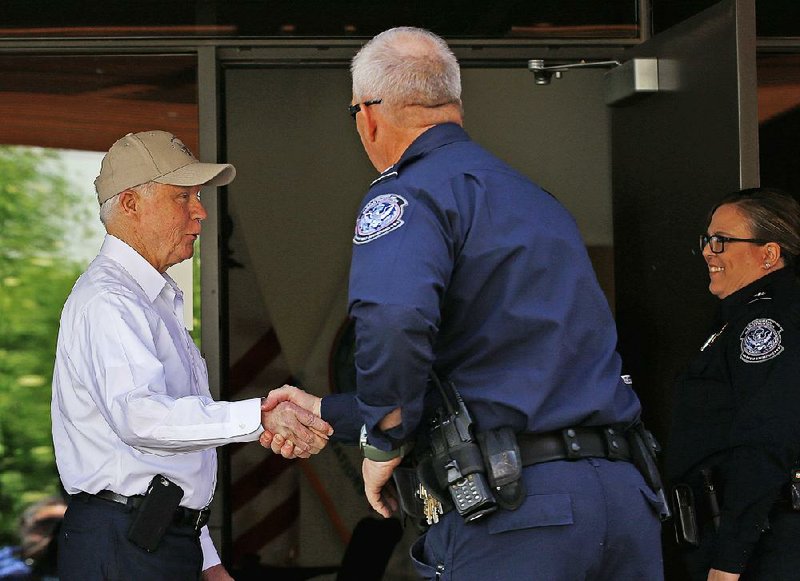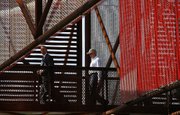WASHINGTON -- Attorney General Jeff Sessions directed federal prosecutors across the country Tuesday to make immigration cases a higher priority and look for opportunities to file serious felony charges against those who cross the border illegally.
In a three-page memo, Sessions directed each U.S. attorney to appoint a border-security coordinator to oversee immigration prosecutions and to make immigration offenses -- such as crossing the border illegally or harboring those who do so -- "higher priorities."
In addition, Sessions said federal prosecutors must consider filing felony charges against people who have illegally entered the country more than once as well as those who marry to evade immigration laws. He also urged prosecutors to consider charging people illegally in the country with felony identity theft and document fraud.
"This is a new era. This is the Trump era," he said. "The lawlessness, the abdication of the duty to enforce our immigration laws, and the catch and release practices of old are over."
[U.S. immigration: Data visualization of selectedimmigration statistics, U.S. border map]
Sessions defended President Donald Trump's proposed border wall, saying it will be another tool to fight illegal immigration along with efforts within the Justice Department and other branches of government to punish and deter border crossers.
The directive signals a more aggressive posture on immigration matters than former President Barack Obama's administration had taken. Advocates and legal analysts said it raises questions about the Justice Department's intentions and its use of resources.
"Which prosecutors and agents does he want to divert from the growing threats like terrorism, cybercrime, the opioid and heroin trade, organized crime and cartel activity?" asked Jenny Durkan, who served as U.S. attorney for the Western District of Washington from 2009 to 2014. "The 'surge' philosophy always requires taking agents, money and prosecutors from other priorities. In fact, the cost of satisfying Washington will reduce the ability of every U.S. attorney to address the greatest threats in their communities."
Sessions touted the changes Tuesday in Nogales, Ariz., as he toured the U.S.-Mexico border crossing there.
[PRESIDENT TRUMP: Timeline, appointments, executive orders + guide to actions in first 100 days]
In his remarks, Sessions outlined a series of changes that he said mark the start of a new push to rid American cities and the border of what he described as "filth" brought on by drug cartels and criminal organizations.
The tour included visiting a port of entry, where Sessions exited an SUV in a white shirt and baseball cap before entering a restricted area.
Nogales, a border city, has witnessed a dramatic drop in the smuggling of drugs and people in recent years as more people enter the country in Texas, many of them Central Americans fleeing violence in Guatemala, Honduras and El Salvador.
The Border Patrol's Tucson sector, which constitutes most of Arizona, saw about 65,000 arrests last fiscal year, roughly half the number agents made in 2012, according to Border Patrol data. Marijuana seizures also have dropped, by about 28 percent from 1 million pounds in 2012 to 728,000 last year.
Sessions said illegal border crossings overall have declined significantly since Trump took office -- dropping 40 percent from January to February and 72 percent in March. Such crossings, though, also have decreased in recent years, and some researchers say demographic and economic factors have more influence than border security on the volume.
"As you know too well, this is a booming business down here. No more," Sessions said in prepared remarks. "We are going to shut down and jail those who have been profiting off this lawlessness -- people smuggling gang members across the border, helping convicted criminals re-enter this country, and preying on those who don't know how dangerous the journey can be."
After the border tour, Sessions spoke to officials at an International Association of Chiefs of Police conference outside Phoenix.
Speeding up removals
The Trump administration has taken a hard-line stance on immigration, alarming activists who say U.S. officials are testing legal boundaries and implementing policies contrary to American values.
Sessions appeared in the White House briefing room last month to threaten to strip federal funding from cities that did not communicate with Immigration and Customs Enforcement, and he signed on to a letter with Homeland Security Secretary John Kelly backing the practice of arresting illegal aliens at courthouses.
Sessions also announced he would expand a program to deport illegal aliens convicted of crimes after they serve their prison sentences, and he said in his prepared remarks Tuesday that he would increase the number of immigration judges to speed the removal of others.
The Trump administration, despite planning to cut $1 billion from the Justice Department's budget, has said it wants hundreds of millions of dollars to hire 60 federal prosecutors and 40 deputy U.S. marshals to focus on border cases.
It also wants to boost immigration courts by $80 million to pay for 75 additional teams of judges. That would speed up removal proceedings for people in the United States illegally and address a backlog of more than 540,000 pending cases. The proposal also calls for adding $1.5 billion to Immigration and Customs Enforcement's budget to find, detain and deport people living in the U.S. illegally, along with more than $300 million to hire 500 new Border Patrol agents and 1,000 immigration agents.
Justice Department lawyers already spend a significant amount of time prosecuting immigration offenses. In fiscal 2015, for example, such cases accounted for 29.3 percent of the entire federal caseload -- behind only drug prosecutions, which accounted for 31.8 percent, according to data from the United States Sentencing Commission. But the prosecutions had steadily declined in recent years and had fallen by 30.1 percent since 2011.
Already, Sessions said in his prepared remarks, the Justice Department has posted 25 immigration judges in detention centers along the border and he plans to add 125 more over the next two years. Those judges, though, handle deportation proceedings -- not criminal cases.
Paul Charlton, the U.S. attorney for Arizona from 2001 to 2007, said Sessions' new directive would simply overburden the U.S. district court system -- which is already struggling to handle the volume of immigration cases. He said that when he was U.S. attorney, his office had the highest number of prosecutions in the country, "yet the number of people entering illegally did not dramatically decrease."
"No one understands better than I do that prosecutions have a deterrent effect, but it's not a solution. Prosecution and incarceration do not adequately address the real need, which is a reform of the immigration laws," Charlton said.
Sessions' memo offers blanket guidance to beef up enforcement, though it is somewhat short on specifics -- omitting, for example, how to handle those coming to the United States with their children, or those fleeing persecution, said Leon Fresco, who worked in the office of immigration litigation in Obama's Justice Department.
The Justice Department, Fresco said, could slap asylum seekers with identity-theft charges merely for using fake passports to get out of a country that otherwise would not have let them leave, or jail parents who cross the border with their kids -- breaking up the family. That would run counter to the assertion by the Homeland Security Department's Kelly that officials will not separate children from their parents.
"There's nothing in the memo that talks about the need to be careful about that," Fresco said.
Separately, a widely criticized weekly report by Trump's administration to showcase local police seen as uncooperative with immigration enforcement was suspended Tuesday after the administration acknowledged the report contained flawed data.
U.S. Immigration and Customs Enforcement identified computer coding problems and mix-ups where jurisdictions were incorrectly placed on the report, said David Lapan, spokesman for the Department of Homeland Security.
Several local law enforcement agencies had complained that information in the reports was inaccurate and unfairly targeted them -- including some jurisdictions supportive of Trump's immigration enforcement efforts.
The administration started publishing the report weekly last month after Trump issued an executive order aimed at encouraging local police to help federal immigration agents trying to carry out deportations. It listed jurisdictions that had been deemed uncooperative.
Information for this article was contributed by Matt Zapotosky and Sari Horwitz of The Washington Post and by Astrid Galvan, Sadie Gurman and staff members of The Associated Press.
A Section on 04/12/2017

